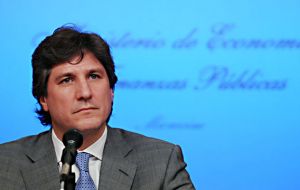MercoPress. South Atlantic News Agency
Argentina set to recover in 2010 with growth reaching 2.5%
 Economy minister Amado Boudou believes worst of the crisis is over
Economy minister Amado Boudou believes worst of the crisis is over Argentina’s Economy Minister Amado Boudou made the official presentation Thursday of the 2010 budget before the Lower House of Congress, in which he estimated that the economy would grow 2.5% in the upcoming fiscal year, with retail prices in the range of 7% and the primary budget surplus 2.7%. of GDP.
The economy is expected to end 2009 with a GDP growth of 0.5%. Private sources insist on a contraction in the range of 3 to 4%.
.Boudou seized the opportunity to criticize developed nations for adopting double standards for the developing world. “It is clear that the developed nations have adopted measures different to those they recommended for developing countries. A joint comprehensive and global intervention in the market led to effective measures against the crisis.”
The minister went on to make a detailed description of the adverse effects of the economic crisis in Argentina, but expressed his confidence that the situation would change in 2010.
“What happened in 2009 was very difficult, some people talking about the possibility of a W-shaped curve, a new decline of the international markets, and say we should be preparing for another crisis with more jobless and a decline of production.”
However, he dismissed that possibility and said the government is “estimating a growth of 2.5% next year... and a fiscal primary surplus of 27 billion pesos, which is 2.7% of the GDP. Boudou estimated GDP would reach 300 billion pesos.
The 2010 budget does not contemplate any changes in export duties. ”These expectations are in line with what happened this year, and the most favourable expectations in the upcoming year,“ he added.
Boudou forecasted an average dollar at 3.95 pesos for 2010, which ”would be a very good thing for Argentina, as many still fear the ghosts of the past“. The minister said 2010 will see economy's growth with fiscal surplus, growing trade and also a reduction of the sovereign debt.
According to a private report the Argentine economy has increased 1.2% during August and it shows its first signs of recovery after the 2008 global crisis. It also states that the economy fell 4.2% according to the inter-annual statistics; this is a higher figure than the one reported by the Argentine government.
”It seems like the worst part of the international crisis has been left behind,” said Orlando Ferreres y Asociados report.
Between January and August, the economic activity contracted 5.5% compared to the same period last year, and those sectors who suffered the most were: agriculture, which fell 18.2% in the inter annual figures, and the manufacturing industry, which dropped 7.8% in the inter annual percentage..
Although most private analysts coincided with the primary presentation of the budget, several disagreed regarding the exchange rate. Daniel Artana from the Latinamerican Foundation of Economic Research, FIEL, said the government will be short of cash to address the growing deficits of the provincial administrations and therefore will be forced “to devalue the currency”. The US dollar will be “closer to 4.50 Pesos”.
Economist Eduardo Curia warned that a semi-fixed exchange rate could have a negative impact on the country’s exports competitiveness, but are also linked to Argentina’s efforts to normalize relations with the holdouts which could reopen access to money markets.




Top Comments
Disclaimer & comment rulesCommenting for this story is now closed.
If you have a Facebook account, become a fan and comment on our Facebook Page!